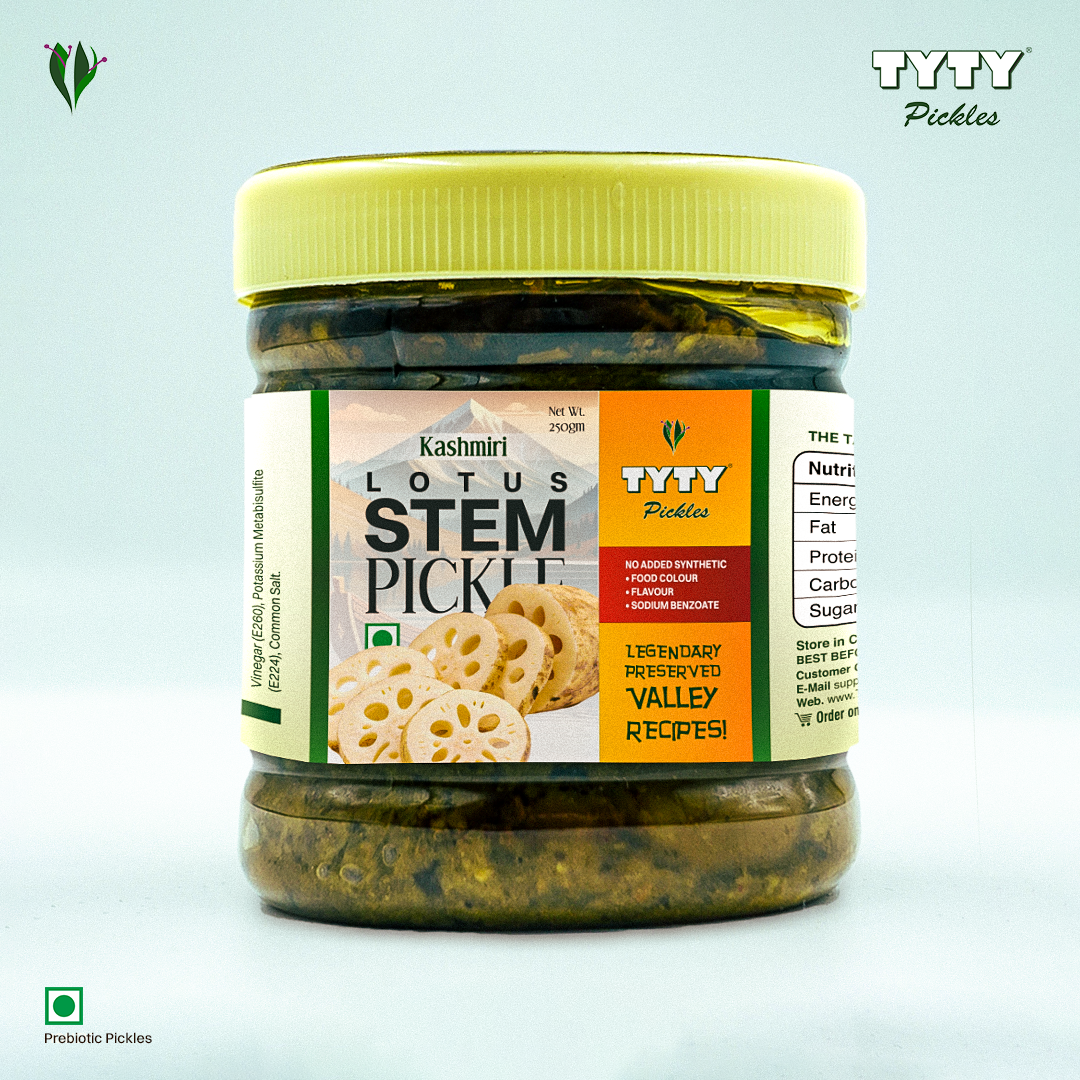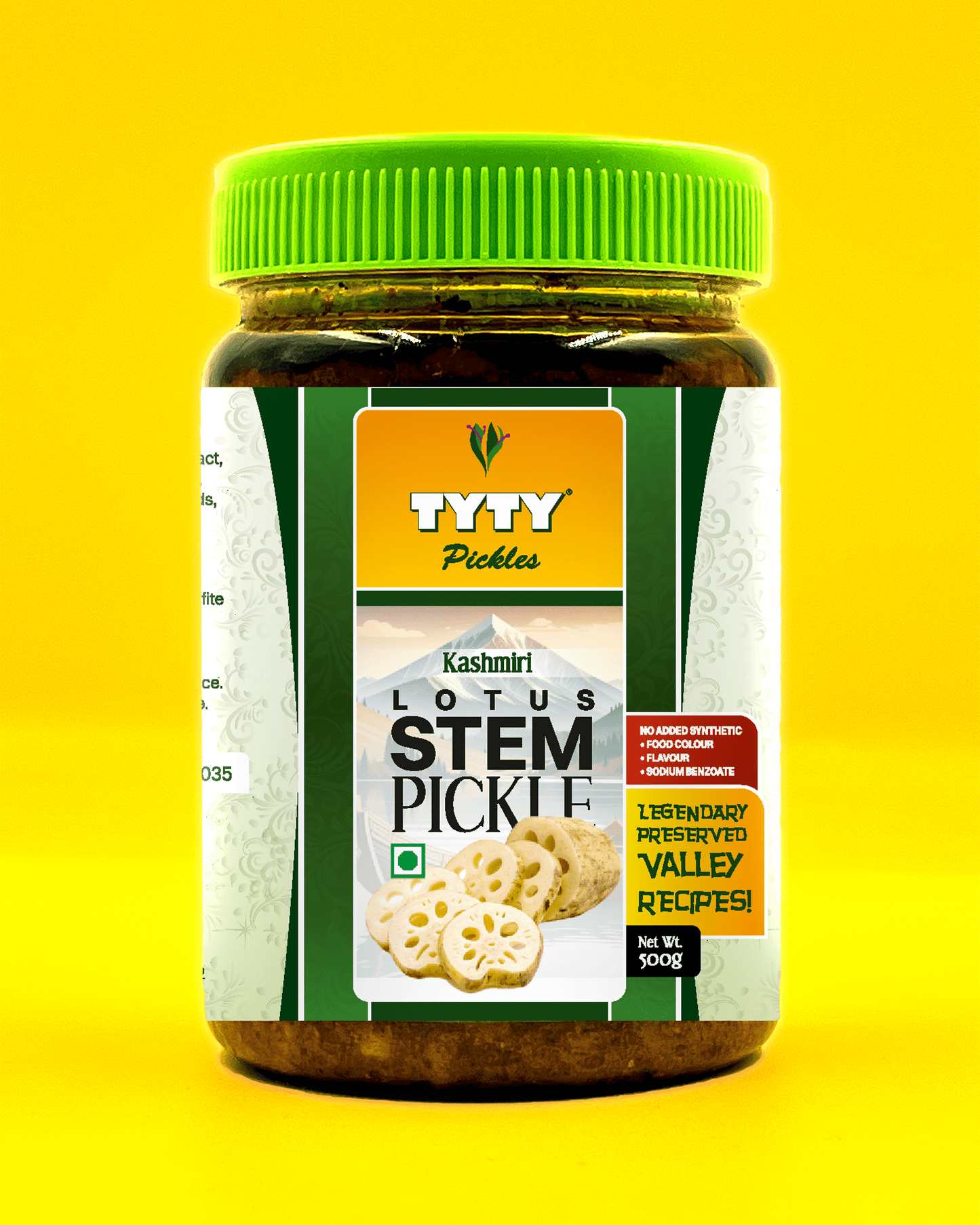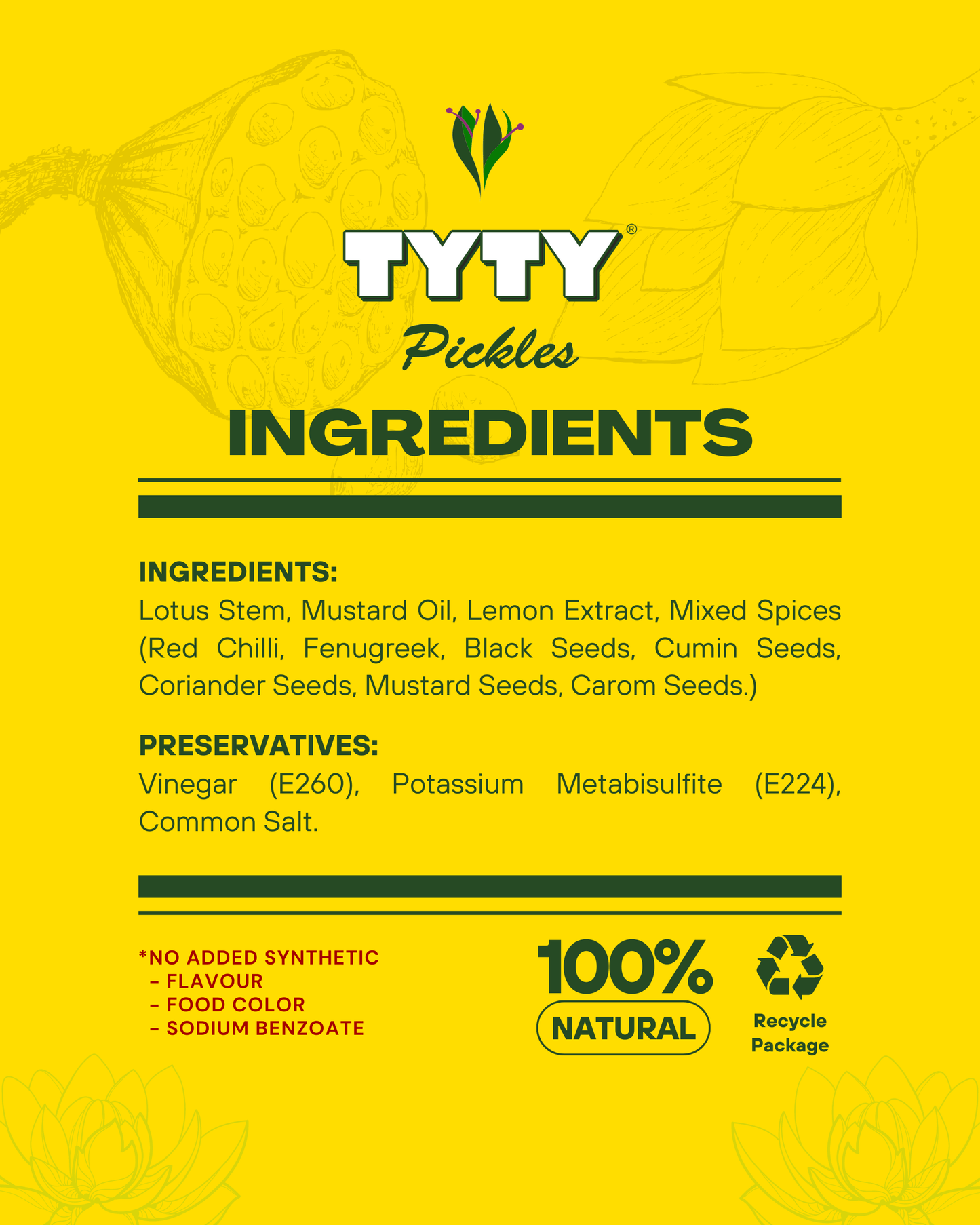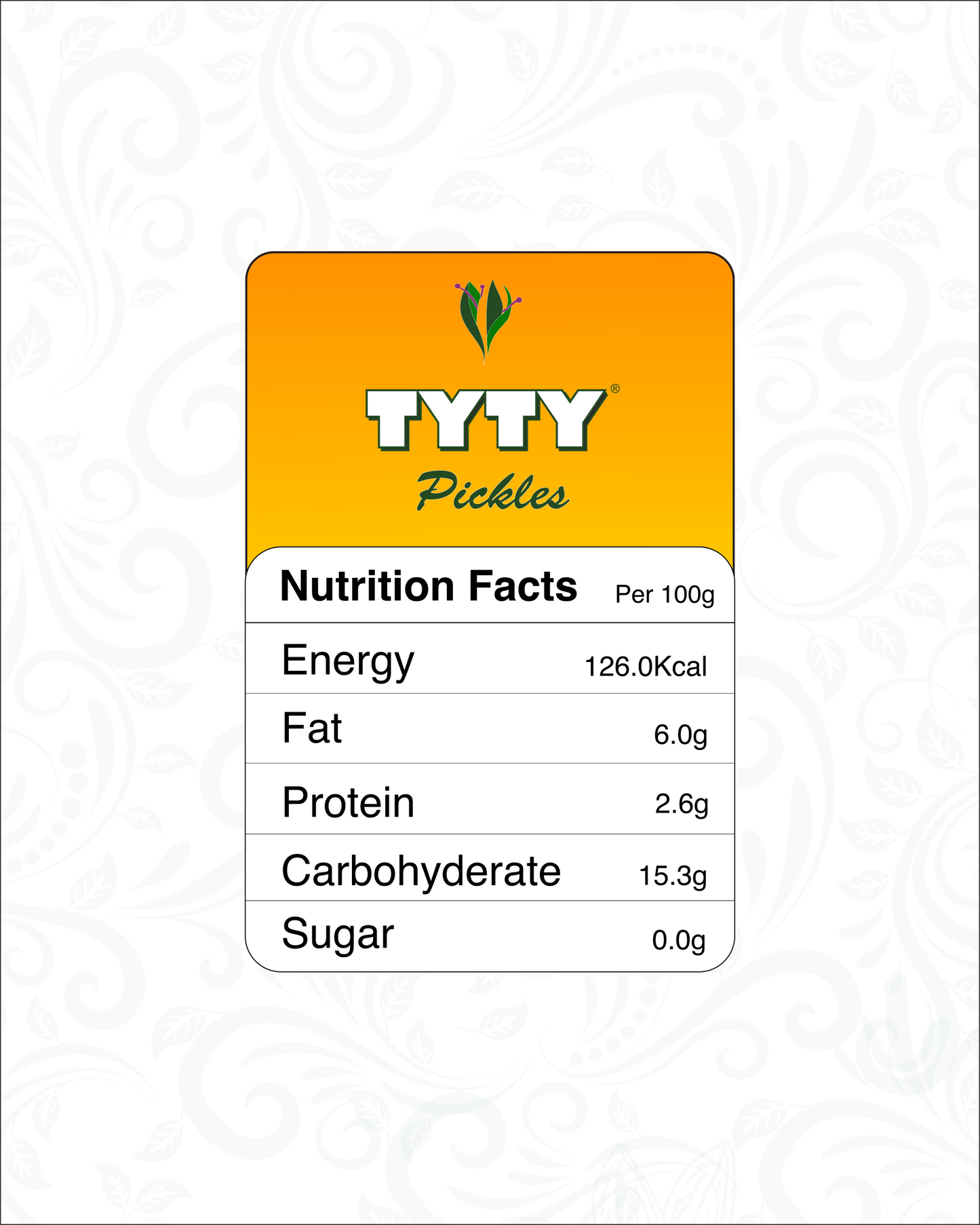TYTY Sciences
PREBIOTIC Lotus Stem Pickle (Kashmiri) | Classic
PREBIOTIC Lotus Stem Pickle (Kashmiri) | Classic
Couldn't load pickup availability
TYTY Kashmiri Lotus Stem Pickle-Classic is brought to our customers straight from the valley of Kashmir, a region located in the northernmost part of India, which is known for producing high-quality lotus stem, also known as Nadru, due to the favorable climate and abundant presence of lotus ponds in the valley. The lotus stem is harvested from the Dal Lake and other water bodies in the Kashmir Valley. The region's unique climate and pristine water sources contribute to the growth of lotus plants with superior quality stems. Kashmiri cuisine is renowned for its unique flavors and the use of lotus stem in various dishes, including pickles.
The lotus stem pickle, or Nadru pickle, is a popular delicacy in Kashmiri cuisine and is often made with traditional recipes using a combination of spices and ingredients. The state of Jammu and Kashmir, which includes the region of Kashmir, is considered a leading producer of high-quality lotus stem and is known for its delicious Nadru pickles.
This pickle is characterized by its unique texture, featuring crunchy and fibrous slices of lotus stem that retain a slight firmness even after pickling. Its general appearance is visually appealing with a vibrant color palette, and the pickle offers a delightful blend of tangy, spicy, and slightly sweet flavors, adding a burst of taste to any meal.
General nutritional values table for Kashmiri Lotus Stem Pickle-Classic per 100 grams:
- Energy: 126 kcal
- Fat: 6.0 grams
- Protein: 2.60 grams
- Carbohydrate: 15.33 grams
- Sugar: 0.0 grams
Ingredients commonly used in Kashmiri Lotus Stem Pickle-Classic include:
Lotus Stem, Mustard Oil, Lemon Extract, Mixed Spices (Red Chilli, Fenugreek, Black Seeds, Cumin Seeds, Coriander Seeds, Mustard Seeds, Carom Seeds.)
Storage:
Here are some tips on how to store this at home:
- Refrigeration: Most pickles should be refrigerated after opening. Read the label to confirm whether refrigeration is necessary. Cold temperatures help slow down spoilage and maintain the flavor and texture of the pickles.
- Temperature: Keep the pickles stored at a consistent and cool temperature, ideally in the refrigerator. Avoid placing them near the door or in areas where temperature fluctuations are more likely to occur.
- Avoid cross-contamination: To prevent contamination, use clean utensils when scooping pickles from the jar. Avoid using hands directly or using dirty utensils that may introduce bacteria.
- Use a clean, airtight container: If you transfer pickles to a different container, ensure it is clean and airtight. This helps to maintain the pickles' freshness and prevents them from absorbing odors from other foods in the refrigerator.
- Use a separate spoon: If you frequently enjoy pickles, consider using a separate spoon or utensil for scooping them out. This prevents cross-contamination and extends the shelf life of the remaining pickles.
Shelf Life:
The shelf life of this product is 12 months .
Some factors that contribute to the uniqueness of Lotus Stem /Nadru Pickle produced from Kashmir:
- Geographic location: Kashmir's geographical location in the northernmost part of India provides it with a unique climate and pristine water sources. These factors contribute to the growth of lotus plants with superior quality stems.
- Dal Lake: Dal Lake, located in Srinagar, is a prominent source of lotus stems in Kashmir. The lake's clean and nutrient-rich waters provide an ideal environment for lotus plants to thrive, resulting in high-quality lotus stems.
- Traditional cultivation: Lotus stems in Kashmir are traditionally cultivated using time-tested techniques that have been passed down through generations. The local farmers possess in-depth knowledge and expertise in growing lotus plants, ensuring the production of high-quality stems.
- Harvesting techniques: The harvesting of lotus stems requires careful techniques to preserve their freshness and quality. Farmers in Kashmir have mastered the art of harvesting the stems at the right maturity level, ensuring optimal flavor and texture.
- Traditional recipe and spices: Kashmiri cuisine is known for its rich flavors and unique spice blends. The lotus stem pickle from Kashmir incorporates a variety of traditional spices, including Kashmiri red chili powder, mustard oil and other ingredients. These spices contribute to the distinctive taste and aroma of the pickle.
- Cultural heritage: The production of lotus stem pickle in Kashmir is deeply rooted in the region's cultural heritage. The recipe and techniques have been preserved and perfected over centuries, ensuring the continuation of a unique culinary tradition.
Health Benefits of Kashmiri Lotus Stem Pickle:
- Potential anti-inflammatory effects: Some studies suggest that lotus stem may possess anti-inflammatory properties, which could help alleviate inflammation-related conditions.
- Low in calories: Lotus stem pickle, when consumed in moderation, can be a low-calorie condiment, which may aid in weight management.
- Potential immune-boosting properties: Lotus stem pickle contains various spices and ingredients known for their potential immune-boosting properties. Spices like turmeric, fennel seeds, and mustard seeds are believed to have antimicrobial and immunomodulatory effects.
- Digestive health support: The combination of dietary fiber and spices in lotus stem pickle may promote digestive health by supporting regular bowel movements and aiding in digestion.
- Flavor enhancement: While not a direct health benefit, the flavorful nature of lotus stem pickle can help enhance the taste of meals, potentially encouraging the consumption of other healthy foods.
Caution:
- Moderation: Lotus stem pickle, like any other pickle, should be consumed in moderation due to its high salt and spice content. Excessive consumption may lead to increased sodium intake, which can be detrimental to individuals with high blood pressure or certain medical conditions.
- Allergies: Some individuals may have allergies or sensitivities to the ingredients used in lotus stem pickle, such as mustard seeds or fenugreek seeds. If you have known allergies or sensitivities, it's essential to check the ingredients list and avoid consuming the pickle if it contains any allergens.
- Consultation with a Healthcare Professional: If you have any specific health concerns, dietary restrictions, or medical conditions, it's advisable to consult with a healthcare professional or a registered dietitian before consuming lotus stem pickle or any other food item.








